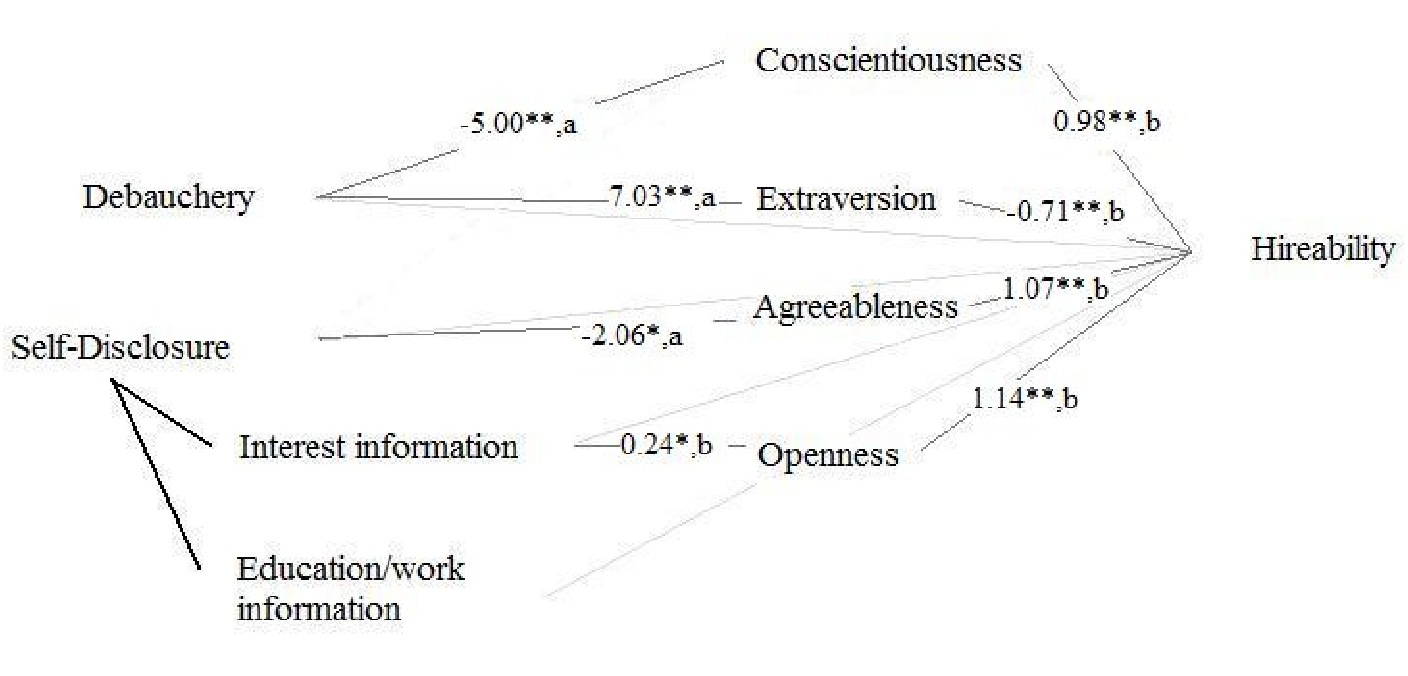Media Effects Research Lab - Research Archive
Employer perceptions of Facebook profiles
Student Researcher(s)
Haiyan Jia (Ph.D Candidate);
Shannon Kennan (Ph.D Candidate);
Alice Shapiro (Ph.D Candidate);
Faculty Supervisor
FOR A COMPLETE REPORT OF THIS RESEARCH, SEE:
Paper presented to the Communication Technology Division of the Association for Education in Journalism and Mass Communication (AEJMC) at the annual convention in Boston, MA.
INTRODUCTION
Whether or not Facebook’s original conception included it being used as an employment tool, it appears that it may be beginning to fill this role. Media reports and researchers have moved from concern about ethics, legal issues, and privacy to suggestions of how Facebook can be utilized by employers to recruit qualified applicants and by Facebook users to attract the attention of potential employers.
HYPOTHESES & RESEARCH QUESTION
RQ: For a population of employers, controlling for age, gender, hours online per week, and whether or not they have their own Facebook profile, what is the effect of the amount of debauchery and self disclosure on hirability, potentially mediated by perception of conscientiousness, openness, extraversion, neuroticism, and agreeableness.
H1 – Debauchery will have a main effect on hirability.
H2 – Self disclosure will have a main effect on hirability.
H3 –Perceptions of personality factors associated with job performance (extraversion, agreeableness, conscientiousness, openness, and neuroticism) will mediate between debauchery and hirability.
H4 –Perceptions of personality factors associated with job performance (extraversion, agreeableness, conscientiousness, openness, and neuroticism) will mediate between self disclosure and hirability. (HR & personality literature)
METHOD
A 2x2 factorial experiment was conducted to measure employer perceptions of Facebook profiles. Debauchery and disclosure were manipulated to measure perceptions of hirability, possibly mediated by the Five Factor personality traits (openness, conscientiousness, extroversion, agreeableness, and neuroticism). The participants were 69 employers at a large, eastern university who were randomly assigned to view a stimulus in one of four conditions (low disclosure/low debauchery, low disclosure/high debauchery, high disclosure/low debauchery, or high disclosure/high debauchery). All participants answered same questionnaire. Ownership of a Facebook page, number of hours online per week, age and gender of employer were also controlled for.
RESULTS
The results showed a main, negative, effect of debauchery on hirability, however we found an unexpected moderating effect. Employers who had a Facebook account were significantly more sensitive to debauchery on Facebook. A borderline significant main effect of disclosure on hirability was found but another, seemingly contradictory, effect also emerged. Employers rated people who they thought disclosed highly as more hirable, but overall, profiles in the high disclosure condition were rated as less hirable, with and without debauchery. Employers stated they liked high self disclosure, but really preferred less self disclosure. Mediation effects on both self-disclosure and debauchery were found as well. The effect of the mediators were generally present and in the predicted direction, showing convergent validity with previous research. The exceptions were extroversion and neuroticism. Neuroticism did not have a significant effect on hirability. Extroversion did have a significant effect on hirability, but not in the direction that the literature predicted.

Figure 1: Personality model for explaining employer perception of Facebook profile affecting hiring decisions.
FBemployer1
*=P<0.05; **=P<0.01.
A: T-VALUE; B: Β-VALUE.
NONSIGNIFICANT PATHS WERE NOT SHOWN.
CONCLUSIONS
Employers in our study seemed to infer personality characteristics based on the Facebook profiles that they viewed, and judge potential employees based on those characteristics. They generally preferred characteristics convergent with the previous literature on hirability, with the exception of extroversion, which was correlated with ratings related to debauchery. In general, employers inferred positive personality characteristics for the profiles with low disclosure and low debauchery. Having a Facebook account strengthened their sensitivity to the debauchery manipulation, possibly due to an increased familiarity with Facebook pages, and possibly due to an increased familiarity of the norms within the Facebook community. We interpret the seemingly contradictory result that employers preferred the low disclosure condition and yet indicated they liked high levels of disclosure to mean that employers actually preferred moderate levels of disclosure, and disclosure of certain types. The actual ratings of disclosure were mostly between 4 and 7 on a 7 point scale, so even the low disclosure condition was not considered to be very low. There was also a positive relationship between interests and work experience and openness, a personality trait positively associated with hirability. Therefore, employers in our study appear to have preferred no debauchery, and moderate disclosure of interests and work experience.
For more details regarding the study contact
Dr. S. Shyam Sundar by e-mail at sss12@psu.edu or by telephone at (814) 865-2173

